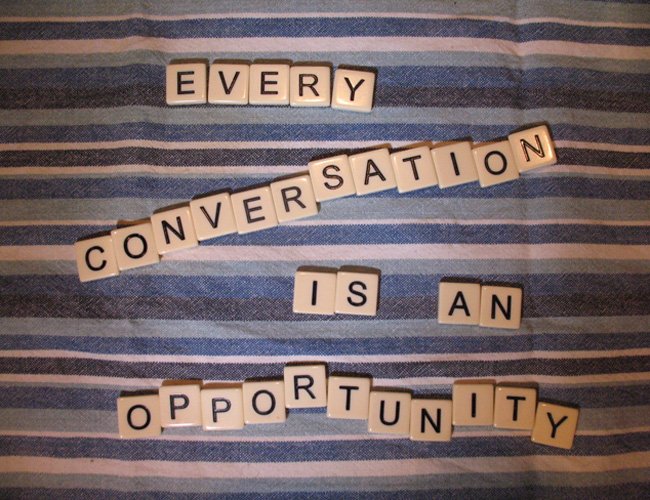 今回の挑戦のきっかけとなった格言。 JACKIE HOFFART PHOTO 親しい人とはよくしゃべるけど、あまりよく知らない人や初めて会う人とは社交的になれないジャッキー。今週のチャレンジはそんな自分の性格改善を図るものです。
I think I'm an extroverted person. I was a class clown at school. I was on the student council in junior high, and in high school I delivered school announcements on the intercom every morning. More than once, I've been told I'm a "motormouth."
And yet, I'm also incredibly socially awkward, especially around people I don't know well — most of all around complete strangers.
I struggle to make small talk. I don't start conversations with people on airplanes. I make inappropriate jokes in inappropriate places, like in important meetings at my company. Maybe it's because my "neutral" facial expression is like a frown, but I've been told I seem aloof. My extroverted interior self does not seem to come across well to strangers or people who aren't already my friends.
When I was a smoker, it was easier because, secretly, all smokers have social anxieties and smoking is where they can be with others like themselves. But now that I'm a non-smoker, I have to find new ways to cope with this awkwardness.
Recently, I was inspired by a saying one of my friends told me: "Every conversation is an opportunity." I realized I'm probably missing out on a lot of opportunities because I'm too afraid (of what, I don't know). That's why I decided to take on this challenge, to push myself to talk to strangers.
However, the idea of confronting random strangers seems a bit like jumping in the deep end, so I decided to break this challenge into two parts. For the first week, I tried to talk to "strangers" at work — people I'm estranged from. Next time, I'll take on complete strangers.
I used to avoid two people at work, let's call them "A" and "B." But deep down, I knew that avoiding them was probably more trouble than it was worth. So I set out to mend these relationships.
"A" is more senior than me and I need her feedback and sign-off regularly on my projects. I always thought she was a bit scary.
I decided to check in with her more frequently, even if it was just to commiserate about a difficult agency we work with, or to thank her for her help earlier. Instead of reducing the number of times I needed to talk to her to a minimum (i.e. avoid her), I tried to talk to her more.
Perhaps she always gave me a cold vibe before because I would come up to her with a big pile of work for her to check. Now, after my more frequent check-ins, she seems more relaxed, knowing that I might just come to her to say hi. She seems like a really pleasant person who probably laughs a lot, but I would've never guessed that before.
I work with "B" four times a year on a seasonal project, but have managed to avoid speaking to her in person since January, amazingly. Maybe she lacks basic social niceties, or just doesn't likes my style of management. Or perhaps she just has a grumpy "neutral" face like me.
With her, I started by joining her table at the canteen one day for lunch. She was sitting with her team, many of whom I get along with really well, so it wasn't that strange. I was able to join in the conversation a few times and it seemed like a big step.
It might be a coincidence, but a few days later she came up to me to ask a question she would normally have emailed. It wasn't a big deal, but it seemed like she was warming up to me somehow.
A few days after that, she approached me again. This time she was checking if it was OK that she'd taken initiative on an aspect of a project I manage. I was quite surprised and also rather happy to finally have something positive happen "between us." I got an opportunity to be genuinely grateful to her, and it felt good.
Both of these rather "successful" attempts at bridging the awkwardness I felt toward work colleagues motivated me to try to be more outgoing. Now I can take on the bigger challenge — talking to complete strangers.
Next time: What if I ... talk to strangers (Part 2)
|




